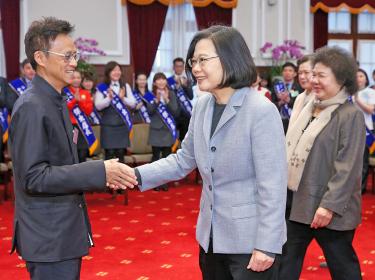Senior pro-Taiwanese independence advocates yesterday in an open letter urged President Tsai Ing-wen (蔡英文) not to seek re-election in 2020.
The letter, titled “An Open Letter to President Tsai — Please Do Not Seek Re-election,” was published by numerous newspapers and signed by Presidential Office adviser Wu Li-pei (吳澧培), former Presidential Office adviser Peng Ming-min (彭明敏), former Academia Sinica president Lee Yuan-tseh (李遠哲) and the Reverend Kao Chun-ming (高俊明).
The four wrote that it was agonizing and with a heavy heart that they decided to write the letter, but in view of a dire and precarious situation facing Taiwanese and advocates of Taiwan’s national identity and sovereignty, they could not afford to be complacent.
They made two appeals to Tsai: Openly announce that she would only serve one term and hand administrative power to the premier.
Tsai should take a back seat and not interfere with the premier assembling and leading a Cabinet, they wrote.
The results of the nine-in-one elections on Nov. 24 last year illustrated that Taiwan-centric groups had been cornered and must be systematically reformed, they added.
In a wake-up call for the Democratic Progressive Party (DPP), Taiwanese cast “no-confidence votes” against Tsai, the letter said, adding that the public owes Tsai nothing, but she “completely” failed the people.
The DPP won 13 cities and counties in the 2014 local elections, but now only has control of six, the group wrote, adding that the circumstances have formed a stark contrast with the popularity Tsai had when she was elected president in 2016.
As the DPP holds a majority of legislative seats, Tsai has held more power than all previous presidents in the democratic era, but she caused the party to lose more than 2 million votes in the local elections, they wrote.
After these setbacks, Tsai should ask herself whether she stands a chance of making a comeback for next year’s presidential election, they added.
The crisis the nation faces after the local elections is that from north to south, there are mayors espousing the view that “the two sides of the Taiwan Strait are one family” and endorsing the so-called “1992 consensus,” which has rendered Taiwan practically “defenseless” to Chinese infiltration, the group wrote.
The so-called “1992 consensus” — a term former Mainland Affairs Council chairman Su Chi (蘇起) in 2006 admitted to making up in 2000 — refers to a tacit understanding between the Chinese Nationalist Party (KMT) and the Chinese Community Party that both sides of the Taiwan Strait acknowledge there is “one China,” with each side having its own interpretation of what “China” means.
With national security organs on the verge of failing, Tsai is no longer fit to lead the nation, as she has been “clobbered” and is “lame” after losing the public trust, they wrote.
The situation calls for a bold and decisive premier who can tighten the DPP’s grip over its administrative and legislative powers to resist Beijing’s “united front” tactics, the four wrote.
This would boost the DPP’s morale, allowing it to rally and win back the public’s trust, they wrote.
As Premier William Lai (賴清德) has made public his desire to resign, the group said that the next premier must have governing experience, be capable and a visionary, and have no intention of running for president so that nothing could hold them back when they push the right policies, the group wrote.
If Tsai pursues her dream of re-election, other candidates would surely emerge from the pan-green camp to challenge her, causing votes to be split, as voters would be forced to support another candidate, they wrote.
Presidential Office spokesman Alex Huang (黃重諺) yesterday quoted Tsai as saying that she understood the group’s concerns, but that there were more pressing matters to consider than her political career.
“It is for no one to decide who will run. Just have faith in the democratic system,” Huang quoted Tsai as saying. “A president should fight for Taiwanese, not their own power or office.”
“In the defense of Taiwan, I have never bowed in the face of pressure. As long as I am president, I shall hold off all pressure,” she was quoted as saying.
At a time when China is trying to force-feed Taiwanese its “one country, two systems” scheme, defending Taiwan’s sovereignty and democratic way of life is the most serious issue, as that would show the world the perseverance and will of Taiwanese, Tsai was quoted as saying.
Meanwhile, a group of young pan-green members yesterday launched an online petition in support of Tsai, saying that in the face of Xi’s “one country, two systems” policy, Taiwanese must remain united more than ever.
“Democracy is Taiwan’s greatest consensus. A democratic society does not need schemes to make emperors or to force abdication,” the petition reads, adding that the DPP would lose more support if its self-reflection degenerates into internal struggles.
The petition had collected more than 2,800 signatures as of press time last night.
Source: Taipei Times - 2019/01/04





















